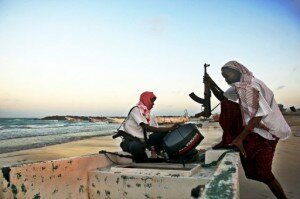Somali Pirates vs. Islamists: A Dispute Over Business

Bartamaha (Nairobi) Even by the jaded standards of the failed state of Somalia, this week’s news was enough to raise eyebrows: one of the country’s two competing Islamist factions, Hizbul Islam, stormed into the coastal city of Harardhere and drove out the pirates who have run amok in the waters off the Horn of Africa, wreaking havoc on global shipping and confounding the world’s navies.
“Piracy has become too much. It’s an anti-Islamic business, and we won’t accept it,” Hizbul Islam spokesman Sheik Mohamed Ali Abdinasr told TIME. “We want to bring law and order to that country of Somalia, and we want to show the good name of Somalis.”
But what may at first glance appear to be a showdown between two trends that have coexisted in relative peace in Somalia until now — piracy and Islamic radicalism — is actually a cunning power play for resources.
First, a bit of background. One of the best ways to thrive as a Somali businessman is to import just about anything — cars, food or clothing, for example. Very little gets produced in Somalia. And in the absence of central government authority, which collapsed 19 years ago, the best way for any armed group to finance itself is to control one of Somalia’s ports.
The Western-backed Transitional Federal Government gets much of its very limited revenue from the Mogadishu port, one of the few patches of Somali real estate over which it maintains control. Hizbul Islam’s capture of the pirate lair at Harardhere may have been motivated primarily by the fact that it was driven out of the southern port of Kismayo late last year by the al-Qaeda-linked al-Shabab militia. Experts say Hizbul Islam attacked Harardhere because it needed a new port to control.
“They lost their foothold in Kismayo when they fell out with Shabab,” says Roger Middleton, a piracy expert at the London-based Chatham House think tank. “Moving to Harardhere seems to me like a move to find some territory that they can control and to have a port in order to try to make some money.”
And there is plenty of money to be had. For all the talk of anarchy in Somalia, business does carry on, and experts believe the economy is doing better than might be apparent. A recent paper by Benjamin Powell, an economics professor at Suffolk University in Boston, says Somalia’s ports are taking in more money than they have in years.
“In post-state-collapse Somalia, ports are doing more business than they ever did under state rule,” Powell said in a phone interview. “So if you look at sheep, cattle and other live-animal exports from Somalia, for example, the volume [following the state's] collapse is greater than it ever was in the 1980s or 1970s.”
While pirate attacks on foreign shipping have dominated headlines, a lesser-known fact is that the heavy flow of imports carried to Somalia by Indian dhows has until recently been left largely unmolested by the buccaneers. Powell and other experts say the piracy trade had actually created a whole category of support enterprises in pirate towns, with local businesses undertaking ship and weapons repair or selling pirates food to feed their captives.
That changed in March, when pirates hijacked several dhows after they dropped their cargo in Somalia. Those raids deterred ?some Indian vessels from making further journeys, denying the Islamist groups the tariffs they accrue by controlling the ports used by the dhows.
“They weren’t happy with the hijacking of the Indian dhows,” says Andrew Mwangura, director of the East African Seafarers’ Assistance Program. “Revenue goes to the ports, and part of the revenue goes to the Islamic movements. The dhows no longer come down there, which means they are losing a lot of money.”
Sheik Mohamed, the Hizbul Islam spokesman, admitted the link to the pirates’ disruption of the dhow routes when pressed about the group’s real reason for targeting Harardhere.
“Food that used to come to businessmen in Mogadishu comes over the water,” he explained. “The price of food is going up since this piracy issue has started. Because of that, we want to control the coastal areas.”
Hizbul Islam leaders now have their sights set on another pirate stronghold, the town of Hobyo. Mwangura and the Somali government believe that the Islamist group, beyond keeping the dhow lanes open, actually wants to muscle in on the piracy trade that last year collected tens of millions of dollars in ransoms.
The Islamic groups insist they reject piracy, but some experts believe they are already involved in the industry — but discreetly, since Western shipowners may be loathe to hand ransom payments to groups labeled as terrorists by the U.S.
Up to now, negotiators who haggled with pirates over ransom fees on behalf of shipping companies and insurers have drawn little interest from law enforcement, but if those ransoms were going to groups linked to terrorism, the cash flow might be blocked off by Western security agencies.
“I can say to you, they are not different from pirates — they also want money,” Yusuf Mohamed Siad, Defense Minister with the Transitional Federal Government, told TIME. “This group has been facing financial problems for some time.”
Other changes may also be having an impact. While pirates have attacked many more ships in recent years, the success rate of those attacks has drastically diminished. In 2008, every second attempted hijacking succeeded; 2009 saw double the number of attacks, but only 1 in every 4 succeeded. Ship crews are getting smarter at avoiding pirates, and the international naval force that patrols Somali waters is becoming more forceful. Last Thursday, a day after pirates seized control of the Russian oil tanker Moscow University, Russian special-forces troops landed on the vessel by helicopter and freed its 23 crewmen. The Russian sailors had locked themselves in the ship’s engine room and disabled its engine.
Much the same scenario unfolded last month when the crew of a Turkish ship, the MV Yasin C, disabled the ship and hid when it came under attack. The pirates, whose main goal was to hold the crew hostage for ransom, could do nothing with their prize and abandoned the vessel.
“The reality in Somalia is that the pirates are not trying to steal the cargo or the ship itself — they’re trying to take control of crew so they can ransom them,” says Chatham House’s Middleton. “If crew are locked in a steel box so that the pirates can’t get them, the pirates haven’t done what they set out to do.”
—————-
Source:- TIME
By NICK WADHAMS/NAIROBI
Comments
comments
 Calendar
Calendar







































